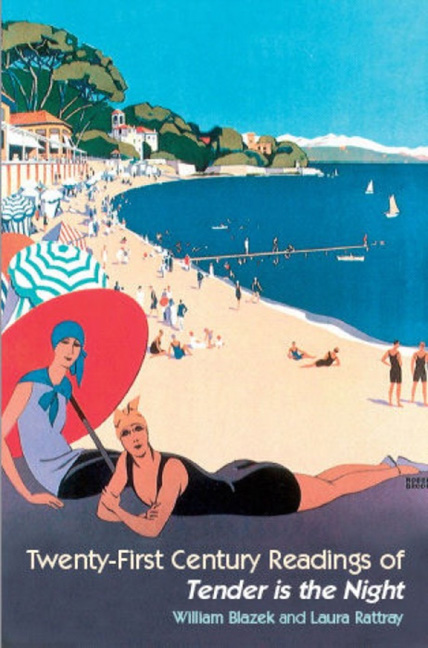Book contents
- Frontmatter
- Contents
- Acknowledgements
- List of Illustrations
- Introduction
- 1 ‘Can't We Put it in Writing?’: Some Short Precursors to Tender Is the Night
- 2 Tender Is the Night, ‘Jazzmania’, and the Ellingson Matricide
- 3 Sanatorium Society: The ‘Good’ Place in Tender Is the Night
- 4 ‘Some Fault in the Plan’: Fitzgerald's Critique of Psychiatry in Tender Is the Night
- 5 An ‘Unblinding of Eyes’: The Narrative Vision of Tender Is the Night
- 6 Si le soleil ne revenait pas: Swiss Clockwork Gone Mad in Tender Is the Night
- 7 ‘A Unity Less Conventional But Not Less Serviceable’: A Narratological History of Tender Is the Night
- 8 American Riviera: Style and Expatriation in Tender Is the Night
- 9 ‘Out Upon the Mongolian Plain’: Fitzgerald's Racial and Ethnic Cross-Identifying in Tender Is the Night
- 10 Gender Anxiety: The Unresolved Dialectic of Fitzgerald's Writing
- 11 Tender Is the Night and the Calculus of Modern War
- 12 Reading Fitzgerald Reading Keats
- Notes on Contributors
- Index
Introduction
- Frontmatter
- Contents
- Acknowledgements
- List of Illustrations
- Introduction
- 1 ‘Can't We Put it in Writing?’: Some Short Precursors to Tender Is the Night
- 2 Tender Is the Night, ‘Jazzmania’, and the Ellingson Matricide
- 3 Sanatorium Society: The ‘Good’ Place in Tender Is the Night
- 4 ‘Some Fault in the Plan’: Fitzgerald's Critique of Psychiatry in Tender Is the Night
- 5 An ‘Unblinding of Eyes’: The Narrative Vision of Tender Is the Night
- 6 Si le soleil ne revenait pas: Swiss Clockwork Gone Mad in Tender Is the Night
- 7 ‘A Unity Less Conventional But Not Less Serviceable’: A Narratological History of Tender Is the Night
- 8 American Riviera: Style and Expatriation in Tender Is the Night
- 9 ‘Out Upon the Mongolian Plain’: Fitzgerald's Racial and Ethnic Cross-Identifying in Tender Is the Night
- 10 Gender Anxiety: The Unresolved Dialectic of Fitzgerald's Writing
- 11 Tender Is the Night and the Calculus of Modern War
- 12 Reading Fitzgerald Reading Keats
- Notes on Contributors
- Index
Summary
After the publication of The Great Gatsby, Fitzgerald's landmark text of American literary modernism, in April 1925, the reading public would wait nine years for the appearance of the writer's next novel, Tender Is the Night, published on 12 April 1934.
Such a laboured birth of his fourth novel had never been the writer's original intention. In May 1925, only two weeks after the issue of Gatsby, Fitzgerald had confidently outlined ambitious (if vague) plans for the new work to his editor at Scribner's, Maxwell Perkins: ‘The happiest thought I have is of my new novel – it is something really NEW in form, idea, structure – the model for the age that Joyce and Stien [sic] are searching for, that Conrad didn't find’ (Kuehl and Bryer 104). In December of that year, Fitzgerald assured Perkins: ‘My novel should be finished next fall’ (Kuehl and Bryer 127). In April 1926, the writer instructed his literary agent: ‘The novel is about one fourth done and will be delivered for possible serialization about January 1st. It will be about 75,000 words long, divided into 12 chapters, concerning tho this is absolutely confidential such a case as that girl who shot her mother on the Pacific coast last year. In other words, like Gatsby it is highly sensational’ (Life in Letters 140–41).
Increasingly, however, Fitzgerald's letters were peppered with anxious references to the slow progress of the ‘new’ novel and with optimistic estimates of the time required to complete future sections of the work. On 11 August 1926, the author informed Perkins: ‘I'll be home with the finished manuscript of my book about mid-December’ (Kuehl and Bryer 144). By the end of November 1928, however, Perkins had received only the first two chapters from Fitzgerald. On 1 March 1929, having returned to Europe from a visit to America – and without leaving further chapters with his editor – Fitzgerald conceded: ‘A thousand thanks for your patience – just trust me a few months longer, Max – it's been a discouraging time for me too but I will never forget your kindness and the fact that you've never reproached me’ (Kuehl and Bryer 154).
- Type
- Chapter
- Information
- Publisher: Liverpool University PressPrint publication year: 2007

